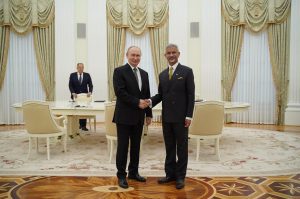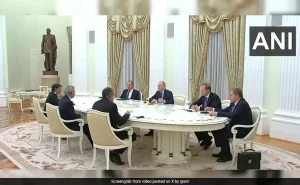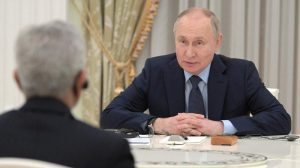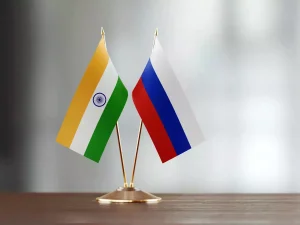Moscow, Russia – External Affairs Minister S Jaishankar‘s strategic visit to Moscow culminated in a significant meeting with Russian President Vladimir Putin on Thursday, August 21, 2025. The encounter where S Jaishankar meets Putin represents a pointed diplomatic signal amid escalating US pressure on India’s energy trade relationship with Russia and recent American tariff impositions.
The high-profile meeting where S Jaishankar meets Putin formed part of comprehensive efforts to finalize President Putin’s anticipated year-end visit to India. This diplomatic engagement demonstrates India’s commitment to maintaining its strategic autonomy despite mounting Western pressure and sanctions targeting Russia-India economic cooperation.
Comprehensive Talks with Russian Foreign Minister

Prior to the presidential meeting, S Jaishankar meets Putin was preceded by extensive discussions with Russian Foreign Minister Sergey Lavrov. These wide-ranging talks focused on strengthening bilateral trade relationships and developing protective mechanisms for their energy partnership against potential US penalties and secondary sanctions.
The discussions between Indian and Russian officials addressed multiple dimensions of their strategic partnership, including trade facilitation, energy security, and diplomatic coordination. The meeting where S Jaishankar meets Putin built upon these foundational conversations to reinforce high-level political commitment to sustained cooperation.
Strong Defense Against US Tariff Criticism


During a joint press briefing with Foreign Minister Lavrov, Jaishankar mounted a robust defense of India’s energy procurement policies, directly challenging the rationale behind recent US tariffs and criticism. The EAM’s statements following the meeting where S Jaishankar meets Putin highlighted India’s position in global energy markets compared to other major consumers.
“We are not the biggest purchasers of Russian oil, that is China. We are not the biggest purchasers of LNG, that is the European Union. We are not the country which has the biggest trade surge with Russia after 2022; I think there are some countries to the South,” Jaishankar declared, systematically dismantling American arguments against Indian energy procurement practices.
US Tariff Impositions and Indian Response
The United States recently imposed a punitive 25% reciprocal tariff on Indian goods, accompanied by an additional 25% duty specifically targeting India’s Russian oil purchases. These measures followed US accusations that India is “profiteering” by reselling discounted Russian crude, charges that New Delhi categorically denies and contests.
The context surrounding the meeting where S Jaishankar meets Putin includes these escalating trade tensions, with Washington applying economic pressure to discourage India’s continued energy cooperation with Moscow. The Trump administration’s tariff strategy represents a significant shift in US-India economic relations, forcing New Delhi to navigate complex geopolitical pressures.
Historical Foundation of Russia-India Partnership
Jaishankar emphasized the enduring strength of Russia-India relations during his Moscow visit, stating: “We believe that relations between India and Russia have been among the steadiest of the major relationships in the world after the Second World War.” This historical perspective provided important context for the meeting where S Jaishankar meets Putin and ongoing bilateral cooperation.
Also Read: Jaishankar Invites Russian Firms: Bold Economic Push Despite Trump Tariffs
The EAM highlighted “geo-political convergence, leadership contacts and popular sentiment” as fundamental pillars supporting the partnership. These elements have sustained cooperation through various global political transitions and continue to underpin current diplomatic engagement despite external pressures.
Russian Perspective on International Relations


Foreign Minister Lavrov articulated Russia’s broader strategic vision during discussions with his Indian counterpart, stating: “We see a special importance in our relations as we see the emergence of a new architecture of international relations.” This perspective frames the meeting where S Jaishankar meets Putin within larger global power realignments and multipolar world developments.
Russia’s emphasis on evolving international architecture reflects Moscow’s strategic assessment of declining Western hegemony and rising influence of non-Western powers, with India representing a crucial partner in this transformation.
Protective Mechanisms Against US Sanctions


Russia’s embassy in Delhi announced activation of a “special mechanism” designed to shield energy trade with India from US sanctions. Russia’s Charge d’Affaires Roman Babushkin characterized Western pressure on India as “unjustified” and “neo-colonial,” supporting Indian resistance to American coercion.
These protective measures provide practical framework for sustaining cooperation despite sanctions threats, ensuring that outcomes from the meeting where S Jaishankar meets Putin translate into continued economic partnership and energy security cooperation.
Bilateral Trade Challenges and Solutions
Beyond energy cooperation, Jaishankar raised specific concerns with Russian officials including India’s widening trade deficit, non-tariff barriers, regulatory hurdles, and reports of Indians serving in the Russian army. These issues demonstrate the comprehensive agenda addressed when S Jaishankar meets Putin and associated bilateral discussions.
Strategic Autonomy and Future Cooperation
The meeting where S Jaishankar meets Putin ultimately reinforces India’s commitment to strategic autonomy in foreign policy, refusing to subordinate national interests to external pressure. This principled stance ensures continued cooperation with traditional partners while managing complex contemporary geopolitical challenges through diplomatic engagement and mutual respect.

